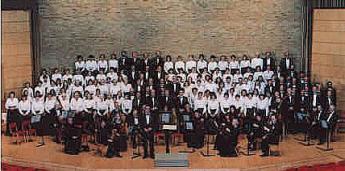Search
Anne L Ryan reports on Collegium Laureatum - West Rd Concert Hall, Cambridge 28 June

It was a bright summer's evening at West Road Concert Hall when Collegium Laureatum, Cambridge's choir of graduates, gave an uplifting performance of Dvorak's Mass in D and Fauré's Requiem. It was a demanding programme conducted and led by Ian Cobb, accompanied by Richard Sands on Organ with Augusta Hebbert (Soprano) and Edward de Minckwitz (Bass-Barritone).
It is the enthusiastic conducting of Ian Cobb that fuses the performances of Collegium Laureatum. From the gentle light vocal motif at the opening of the Kyrie to the powerful earthy opening of the Gloria, Cobb's direction harnessed the ebb and flow of this dynamic with alacrity in this superb performance of Dvorak's Mass. The altos, leading with great sensitivity, blended beautifully during the Credo, encouraging a light easy response from the mixed voice choir. The line 'Et incarnatus est de Spiritu Sancto ex Maria virgine' (And took flesh by the Holy Spirit from the Virgin Mary) was most uplifting, giving way to male voices who came into their own on 'Et iterum venturus est cum gloria judicare vivos et mortuos' (He will come again with glory to judge the living and the dead). Richard Sands' (organist) delicate playing created some moving moments. The blend of organ and tenor voices at the end of the 'Agus Dei dona nobis pacem' (grant us thy peace) was a particularly magical one.
Completely warmed up the choir went into Fauré's Requiem with a combination of vigour and dignity. Most pleasing was their rendition of the Offertoire where they resonated beautifully with the Baritone soloist Edward de Minckwitz creating a magical tone on the final Amen. Soprano Augusta Hebbert's warm luscious voice was in complete control when she sang the Pie Jesus - so much so that it was a disappointment when it ended. She and Edward de Minckwitz, whose deeply resonant voice delivered two powerful solos, created between them some of the most moving moments of the evening.
Writer: Anne L Ryan